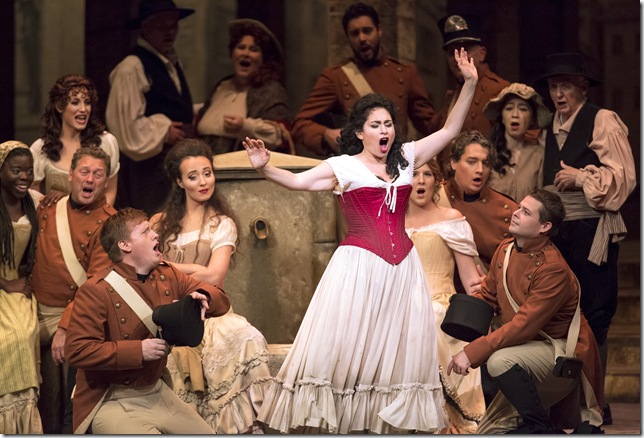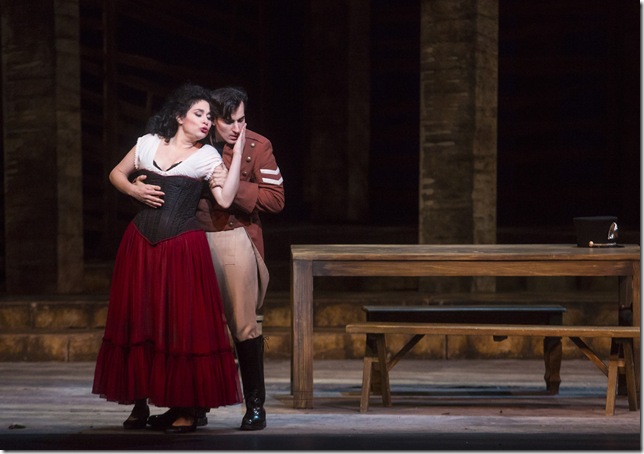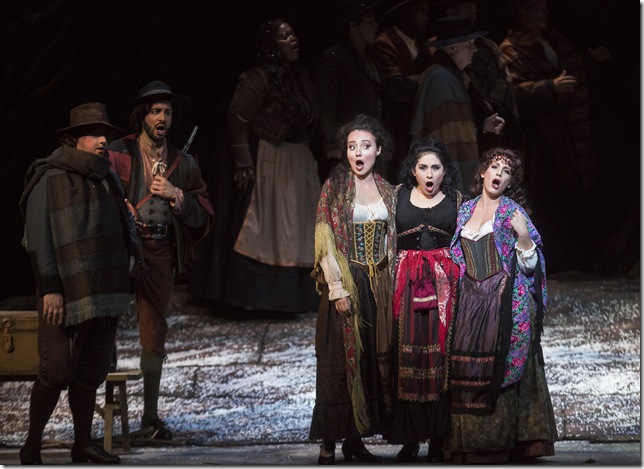Georges Bizet’s Carmen is a box-office lock, as Sunday afternoon’s performance at the jam-packed Kravis Center amply demonstrated.
But because of that, opera companies have been known to take it easy production-wise and let the music do most of the communicating. Thankfully, Palm Beach Opera’s presentation of this tremendously popular work (it last presented the piece in 2010) brought this tale of obsession and tragedy back to life with no-nonsense respectful skill and excellent singing.
Director and choreographer John de los Santos, working on an old but effective Cincinnati Opera set by Paul Shortt, keeps the action moving along, particularly in the opening act, and he contributes a stylish mini-ballet, elegantly executed, at the beginning of the final act.
Starring as Carmen was the Israeli mezzo-soprano Rinat Shaham, who has performed this role at least 40 times in the past 15 years; local audiences may have seen her do it 10 years ago for Florida Grand Opera. She is a very fine Carmen, with a forceful, dark mezzo, a fine sense of musicianship, and good acting chops.
She doesn’t bring white-hot energy to the role, but rather a strong sense of character and willfulness, and this makes her more believable as an object of desire than if she was that hot girl everyone wants to be with. She is an adult Carmen, confident about herself and recognizable as a member of a community rather than a sex supernova, and Shaham made her more than usually compelling.
Opposite her as Don José was the American tenor Leonardo Capalbo, and he was wonderful. Not only does he have one of those inimitable Italianate voices that define the opera-going experience for so many viewers, he acted the role beautifully. His “La fleur que tu m’avais jetée” was tender and then over-the-top passionate, with a carefully graded, easily achieved scale at the end, and his acting was a very persuasive portrayal of a man desperately in love who has the soul of a stalker.
It’s one of the few Don José’s I can remember seeing in which the tenor was equal to the role, and Capalbo made it look easy.
Greek soprano Eleni Calenos was a good Micaëla, with a voice on the lighter side, which in her “Je dis que rien ne m’épouvante” in Act III led her to be somewhat overmatched by the Gounodian swelling in the orchestra. It was touching to see her hide and watch Don José read his mother’s letter in Act I, and her non-confrontational attitude in the third act was very much in keeping with the delicacy of her vocal approach.
The American baritone Zachary Nelson was an excellent Escamillo, all swagger and pride, and with a big, confident voice that commanded attention for his “Votre toast” in Act II. South African bass Musa Ngqungwana also stood out as Zuniga; he has a rich, powerful, creamy voice that one wants to hear in much larger roles. He was restricted here, but I found him believable as a military officer with ethical issues. De los Santos has him killed off in the final seconds of Act II with a cut to the throat, an unusual but logical choice.
Four of the company’s Young Artists filled out the smugglers’ roles, with soprano Jessica Fishenfeld and mezzo Fleur Barron as Frasquita and Mercédès, and tenor Robert Watson and baritone Jason Duika as El Remendado and El Dancaïro. Barron was particularly good, with a prettily colored mezzo that stayed in the memory, but all four did handsome work, especially in the Act II quintet with Carmen, “Nous avons en tête,” with its treacherous back-and-forth writing that demands split-second timing to work well.
A former Young Artist, baritone Tobias Greenhalgh, was quite good as Morales, a very minor role, but one that’s important because if it’s well-sung, you can be pretty sure the rest of the singers are well-cast, too, which indeed turned out to be the case.
David Stern, the company’s chief conductor, is a resident of Paris and made a point of stressing fidelity to French language in his direction, which may have contributed to the overall smoothness of this production. His tempos were quite brisk, especially in the overture (during which the audience hummed along as the “Toreador Song” appeared), and he made a very smart point of singling out the dramatic turning points between Carmen and Don José by pulling the orchestra way back and framing it in an atmosphere of quiet menace.
Greg Ritchey’s chorus was very good throughout, with little of the male-voice weakness that frequently afflicts this opera. That may also be an indication that vocal quality in general has stepped up for this company. The orchestra under Stern was splendid, never outshining the singers and making the most of this cannily orchestrated score.
The Young Singers of the Palm Beaches, stepping in as the company’s children’s chorus, did a very fine job, and clearly enjoyed their moments on stage. Kudos, too, to dancers Kassi Abreu, Laura Gill and Dominique McDougal, who added a welcome hint of deeper Spanish color.
This was a Carmen that stayed true to tradition, for the most part, and while it broke no new ground, it fulfilled its mission thoroughly, anchored by a group of voices that were cannily cast and indicative of a much richer vocal bench than has been the norm for this troupe. And that may have been the most exciting thing of all about this production.
Tonight, Palm Beach Opera presents an abridged version of Spanish composer Enrique Granados’s lone opera, Goyescas, in a free One Opera in One Hour workshop performance at the Harriet Himmel Theater in CityPlace. The opera begins at 7:30 p.m. Call 833-7888 for more information.


